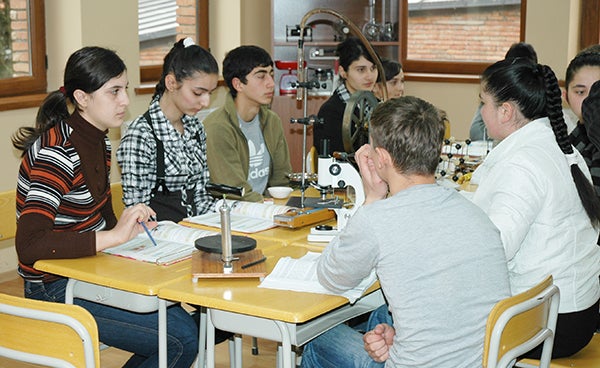
Educational change is a complex endeavor for any country – especially in the context of social, economic and political transition, not to mention globalization. And Georgia is no exception.
The country’s path toward systematic education reform began in the 1990s and has been long and significant – indeed, it has undergone a paradigm shift since the days of the Soviet system. Today, Georgia’s education curriculum and standards are far more advanced, the allocation of educational resources is more efficient and transparent, and major improvements have been implemented with regard to regulation and management of the education sector overall.
Education reforms have had an especially noticeable impact on the financing and governance of Georgia’s educational institutions. The words “corruption” and “nepotism” are no longer used when describing the education sector – a far cry from the early 1990s when they were considered the most pressing issues facing the sector.
Today, Georgia’s education sector faces different challenges, however – which have largely to do with the quality of education. Important questions revolve around the relevance of the skills, knowledge and attitudes learned at school: are they fully compatible with the needs of the country’s growing economy and with the competitive global economy of the 21 st century? And if not, why not?
Young, talented graduates of higher education in Georgia often struggle to secure relevant job opportunities. Many of them report a lack of opportunity to acquire practical knowledge and experience as part of their higher education - for example, through internships that could potentially improve their employability potential. The links between the existing university programs and industry and career guidance support services are slowly emerging, but not yet strong enough to facilitate graduate employability.

One effective way to measure the quality of a country’s education is international benchmarking through student assessments. Georgia has participated in several well-recognized international student assessments, such as the OECD’s Programme for International Student Assessment (PISA), the Trends in International Mathematics and Science Study (TIMSS) and the Progress in International Reading Literacy Study (PIRLS).
Judging by the results of these international assessments, it would appear that the education reforms of recent years have not led to desired improvements in the quality of education in Georgia.
While the performance of students aged 15 years has increased noticeably in mathematics, reading and particularly science between 2009 and 2015, according to two PISA cycles, Georgia remains about 2.5 years of schooling behind the OECD average.
Labor market outcomes in Georgia also suggest a skills mismatch – which is reflected in the high rate of unemployment among higher education graduates. The skills mismatch is confirmed by employer surveys carried out in Georgia, including the World Bank’s Skills toward Employment and Productivity Survey (STEP, 2013). In addition, business owners have identified an inadequately educated workforce as the number one constraint to doing business in Georgia, according to the World Economic Forum’s Global Competitiveness Report, 2015-2016.
But which specific areas and approaches to improving education in Georgia should be prioritized going forward?
For example, should the focus be on attracting and retaining high-caliber teachers? After all, global economic research has identified teacher quality as one of the main determinants of both student achievement and economic returns.
Should we perhaps focus on investment in pre-school education? Or promote innovation and productivity through reforms of tertiary education? What would be the right combination of elements in designing future education reforms to achieve meaningful outcomes in a consistent manner?
Next steps could perhaps involve the following: having a national conversation about the kind of education system we Georgians would ideally like to have, and then to build consensus around what we should prioritize for the next wave of education reforms. At the same time, Georgia could also benefit a great deal from global education research, including the experiences and lessons learned from education reforms in other countries. What do you think?


Join the Conversation